
Issue 184
November 2019
Despite having a congenitally amputated left arm, Nick Newell has defied expectations to fight at the top level of MMA. Having retired to build a gym, he’s back and now has his eyes on the title.
Most fighters are looking for a USP. Nick Newell has never needed one. The 33-year-old was born with a congenital amputation of his left arm, which ends just below his elbow. With a dextrous, very muscular left forearm taking the place of an arm that never formed, a never-say-die attitude and a shrewd way of thinking his way to the next base in a complex career, Newell has become a formidable force in mixed martial arts as both a pioneer and a fan favorite.
In recent times, he has achieved the career milestones of competing in the aegis of the two most powerful MMA fight leagues in the world: the UFC (counted as Dana White’s Contender Series) and in Bellator, in which he made his debut in Bridgeport, Connecticut on August 24 with an impressive first-round submission victory over Corey Browning.
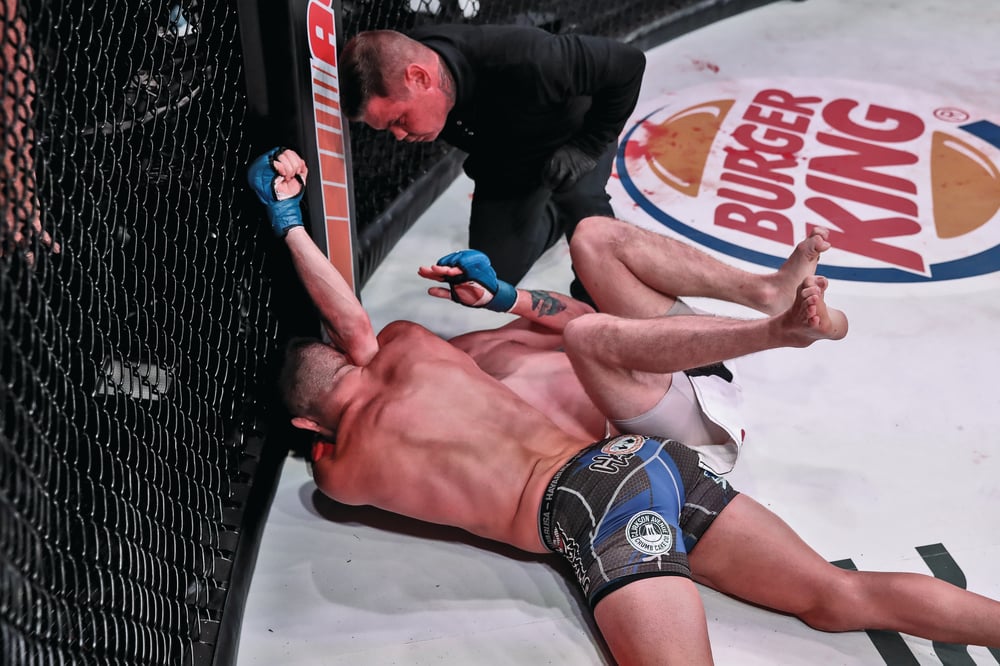
And if a Unique Selling Point was needed, how about the fact that he faced Justin Gaethje for the World Series of Fighting lightweight title? Yes, that Nick Newell. The one who sprang to prominence with fans in 2011 at the event renamed ‘Tribute’ in honor of Newell’s friend and fellow XFC signee Abi Mestre, who was killed in a motorcycle accident. They were close.
Newell defeated Denis Hernandez at XFC 15 with a dominant 71-second submission (heel hook) victory, with over 4.5 million views on the internet. Spanning a decade in the sport, Connecticut-born Newell has lost just twice in seventeen fights, his second defeat last year in White’s Contender Series, to Alex Monuz, over three rounds in Las Vegas.
As he said last year in his post-fight interview after defeating Sonny Luque at a Legacy Fighting Alliance main event: “Life is a cold hard place. You can either become a victim of circumstances or you can create your own. I’m out here. I’m creating my own circumstances. I’m one of the best fighters in the world and I belong in the UFC – I’ve proved it fourteen times.”
Instead, Newell has been signed by Bellator at a time when they are on a growth spurt. Earlier this year, he cropped up at the Mohegan Sun Resort alongside Michael Venom Page and Paul Daley at a Bellator event, where the two stand-out Brits were meeting in their welterweight showdown that dazzled all for the way it played out. It was intriguing to talk to Newell, and we have crossed paths a few times since.
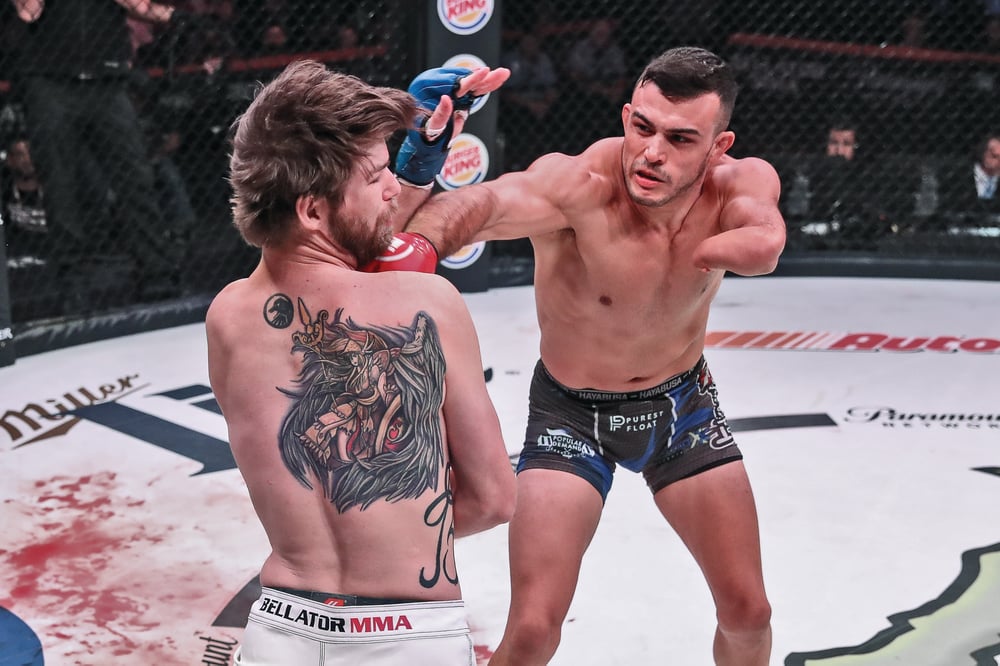
There is something immediately inspirational about him, an assuredness that he exudes. He has been doing this since he was born. Basically, being Nick Newell. Proving to himself, one suspects, as much as anyone else, that he is ‘normal’. If a fighter can be called normal, which they are not. Which makes Newell all the more special.
Indeed, many human beings come into the world in different shapes and sizes. The most decorated Paralympic athlete from Britain, Dame Sarah Storey, had her left arm wrapped up in her mother’s umbilical cord in the womb, and her hand, therefore, never fully formed. It has made her a swimmer, cyclist, and campaigning sports and society activist of note.
Newell, meanwhile, clearly a child with an acute sense of his own physicality, learned from a young age to grasp objects with his forearm. By the time he was in high school, he had opted to join the wrestling team, and even thought about quitting after his very first session. He calls it “the hardest thing I had done in my life” but what that moment did was awaken the fighter in him.
Growing up in Milford, Connecticut, Newell’s mother had given birth to him young, worked her way through school and become a nurse. His mother told him after that first arduous wrestling session that he “was not to quit”. There was no way he wanted to face his mother’s wrath. He is, to make matters even more difficult, left-handed (the arm that has the congenital amputation). So he has had to learn to do more with his full arm, while wanting instinctively to use his left.
“Obviously I’m right-handed. But if I’d skateboarded I’d be a leftie,” he explains. As a young child, he tried out at a few things.
“My dad took me one year to wrestle. But I never competed, just went to practice. At the time I played soccer and baseball. I was good at soccer and quicker at basketball. Baseball took me a little longer. First year I only made one or two hits but after that, I made the all-star team every year because of my work ethic.”
At this point, he didn’t see himself as a professional sportsman.
“I was just doing it for fun, not even for exercise. I like to win things and take risks. I was always like that. I see people doing things and I want to know how I’d do against them. I was never afraid to put myself out there and take the risk.”
But it was wrestling that taught Newell how to fight; there is no history of bullying or being picked on, as far as he relates. In the course of his high school and college wrestling career, he amassed more than 300 victories, developing a penchant for pushing himself as hard as he could.
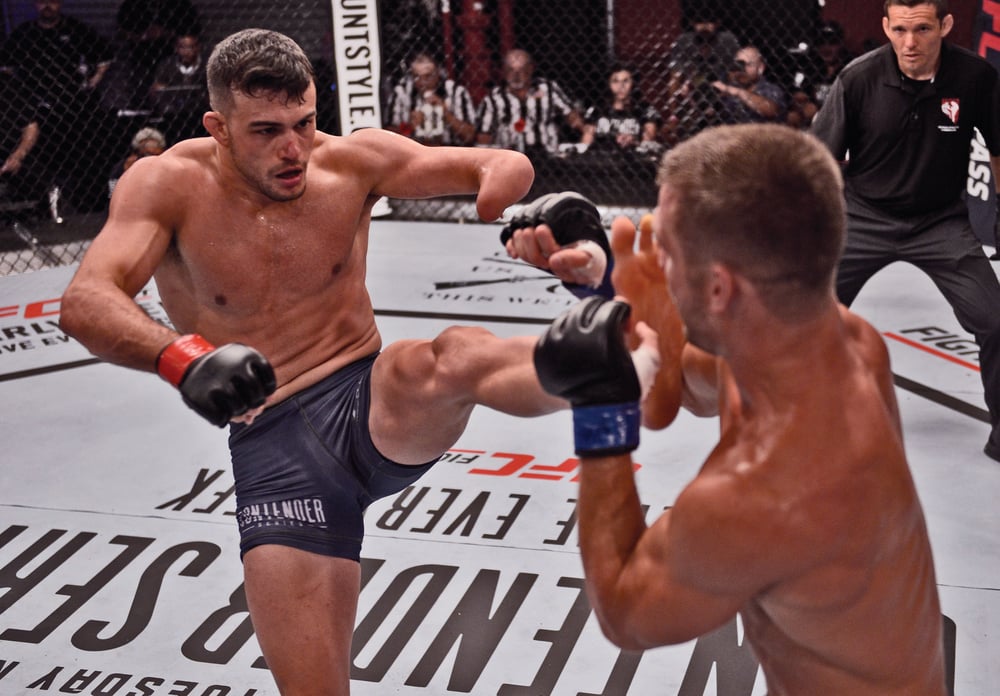
The challenges of being a professional fighter then drifted into his horizon. Growing up, he looked for heroes, and admits to idolizing the former Yankees pitcher Jim Abbott, who has no right hand. Abbott played ten seasons in Major League Baseball with the California Angels, New York Yankees, Chicago White Sox, and Milwaukee Brewers, in periods from 1989 to 1999. It was while he was in college that Newell’s ideas of becoming a bona fide pro-fighter began to crystallize. His roommate in college was the now WWE wrestler Curt Hawkins (real name Bryan Myers). Together they watched Spike TV, The Ultimate Fighter, aired on the same channel right after WWE Raw, Newell drawing inspiration to plot his post-college life.
It has certainly been a long road, Newell explains to Fighters Only in this exclusive interview.
“I turned professional over ten years ago. It’s been a long journey, but good things happen to those who work hard and stay consistent.”
But has he been driven more because of his ‘perceived’ disability, wanting to prove things to other human beings, always wanting to be a game changer?
“I guess so. It’s never been a goal of mine to do anything like that. I’ve always been someone to follow their heart and just do what felt right. I’m not someone who has let adversity stop them. Adversity comes in many different forms. I’d never compare my road to anyone else’s, but I’m the man I am today because of it and I stay grounded.”
Peculiarly, the career path has been a tardy one in some ways because of his ‘disability’ and the reaction to it from other fighters, other competitors. But there have been some advantages, he concedes, along with the minuses.
“I think it gets me a little more attention -- but also a lot more criticism,” explains Newell who is now a father to son Wyatt, whom his wife gave birth to last year. “There are those people who want to see me fight and see what I can do. People who’ve had tough lives and want to see someone overcome things. Then there’s other people who want me to lose so they can tell me ‘I told you so’. They are ‘My fans’. It’s one end of the spectrum and the other. I have the most radical amazing fans and then I have some haters out there. At the end of the day, the way I look at it is if you’re talking about me and watching my fights, then that’s good for me.”
There is little doubt that it was hard to get opponents at various stages earlier in his career.
“When I first started people would fight me and then they found out I was good. Then it was a lose-lose situation because if they win, they beat a guy with one arm; and if they lose, it’s to a guy with one arm. I’m really only missing a part of my hand. I’m a good fighter. If you’re a real fighter you’ll step up and fight the guys who are good. It changed: after I started beating people and making a name for myself, people started calling me out which I loved.”
We discuss the Paralympic Movement, described by the United Nations General Secretary Ban Ki-Moon as having the “potential to advance peace and human rights, a changing force for good in society.” Paralympic Sport already includes combat sports.
“I support the Paralympics and I think it would be great to see wrestling added to it,” Newell argues. “If you look at NCAA champion Anthony Robles, he only had one leg. It’s something a lot of us are into. It would be cool to see people get the opportunity to do it at a high level.”
Indeed, presenting the thoughts of Newell to Andrew Parsons, President of the Paralympic Movement just a few days after the interview with the American athlete, Parsons was quick to remind me that Tokyo 2020, “will include Para-Taekwondo for the first time.” There is already partially-sighted judo at the Games for those with disabilities, and a movement that creates “seismic shifts in society” every four years when it takes place.
Parsons believes that if Los Angeles gets the Olympic and Paralympic Games in 2028, it could be “a game changer like London”, which sold, overall, more than 2 million tickets. Los Angeles would be the ideal place for any form of disability wrestling to make its bow at the Paralympics.
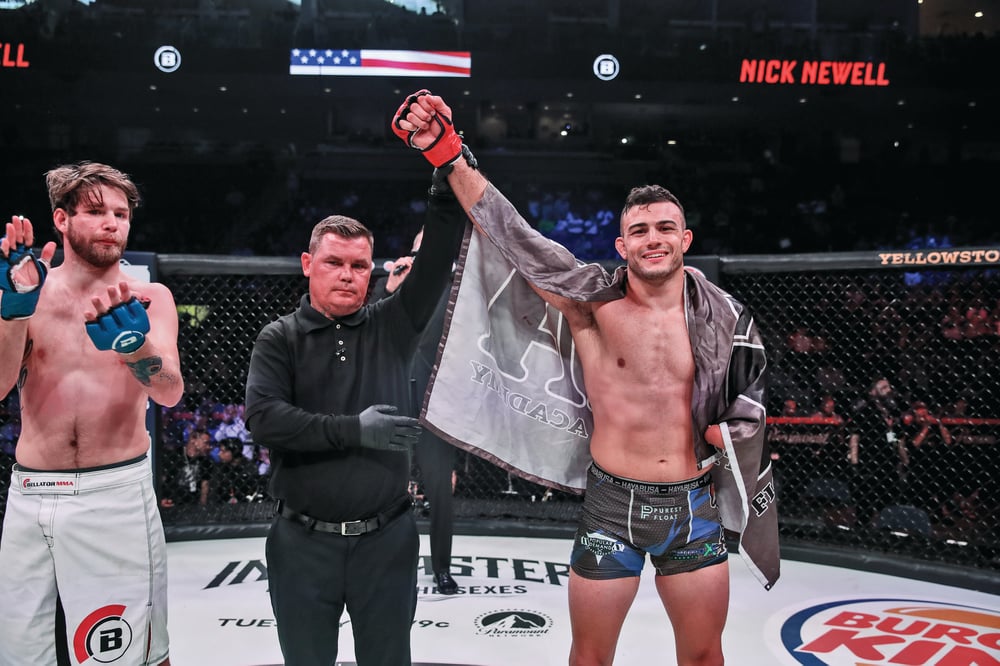
Mixed martial arts, as we know, can be a tough, cut-throat world. But relationships and meaning run deep. Connections are forged for lifetimes. Shared relationships are forged forever, and Newell gets major props from fellow fighters.
“I get a lot of respect from my peers. I show people respect and I work hard. If I go somewhere, I show people respect. The other day I was at Glover Teixeira’s gym and he was getting mad at someone. He started talking about me and how I don’t make excuses. It meant a lot to me coming from one of the best fighters in the world.”
Would he ever consider taking his skills to the WWE?
“That’s never been a goal of mine. It’s just something I enjoy watching.and I used to go and support as a fan. I have a training partner who was in the WWE with The Heart Throbs – Antonio Thomas. I’ve been training with him for a long time and he wants me to do a runout, but it’s not really my focus.”
In fact, he announced his retirement in October 2015, after defeating Tom Marcellino by unanimous decision. He had just won. “Never say never, but this is not like I’m going to change my mind (in a couple of days),” Newell said after winning at Foxwoods Resort and Casino in Mashantucket, Conn. “This is something serious. I think this is it. I think it’s time, and I’m going to focus on some other things.”
“It’s a hard decision, but I think I’ve proven a lot,” he said then. “I was never the best in the world, but I was always a fan favorite and I always came to fight. Tonight was not the real me, and I don’t want to give that to my fans. I want them to remember me as the guy throwing people over his head and going bonkers and heel-hooking people. I’m not that 25-year-old kid that can come out like a whirling dervish looking for blood. I’ve been doing this since I was 14 and I never stopped because I always wanted to be the best version of me possible, and my time is up.”
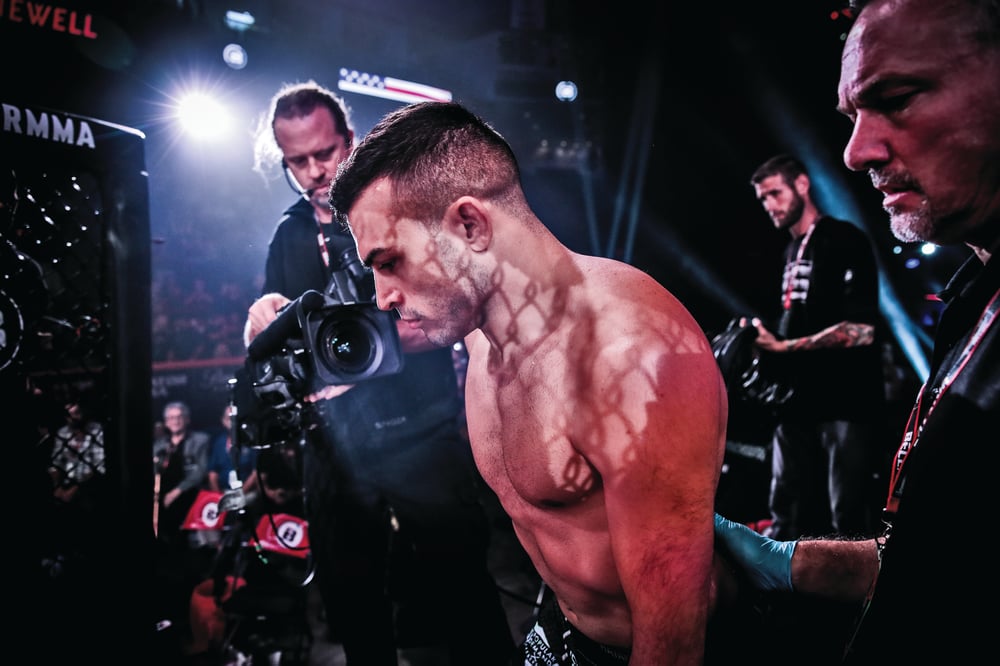
He had said he had other plans, and intended to become a coach. In fact, what he did for two years was to build a gym. He did it. Himself. Then he came back. Between 2015 and 2018, he just applied himself to constructing the gym, like he had everything else in his life, by dint of hard work and perseverance.
To make ends meet, he had other jobs after ‘retiring’.
“I used to work the control board for the History Channel over here on this side of the pond. And in A&E. I would train all the time as well, and I got fired when I fell asleep at work.
“I did the fighting stuff professionally until 2015,” he continues. “Then I set up my own gym. That makes me money and I still do the fighting stuff. I have my fight money which is nice and then I have my income which is a little more steady. In the period away from fighting (2016-2018) I was working to build my gym.
“I’ve been pretty frugal with my income, ” he continues. “I’ve saved my money. I knew that if I got hurt and couldn’t fight I couldn’t make any money. I saved my money for that time. Right after the World Series of Fighting (and retirement) I worked on getting my gym open. I opened it slowly and grew it steadily. I’ve now grown it into one of the best gyms in Connecticut.”
It fulfills him, keeps him near the lifeblood that stimulates him. Keeps his fighting options open.
“I teach most of the classes but we have a team,” he explains. “I built it myself with a few other people’s help. It’s not purely professional. I have about 85 members. It’s a good start. It’s called Fighting Arts Academy CT. It’s moving and we’ll move to a new location after my next fight.”
He’s now with Bellator, of course. What are Newell’s ambitions under the banner of CBS-owned Bellator?
“I want to keep going. I’m only getting better. I’m in the prime of my career. I need to make a run to the lightweight title – or fall flat on my face. I’m open to challenging myself. I’m going to see how far we can push the envelope and how far we can take it. It’s only a one-fight deal. I’ll get this fight done and we’ll go from there.”
Somehow, there is the sense with Nick Newell that we will be hearing from him for a long time to come: as a fighter, a trainer, and – of course – as a pioneering human being.
...









